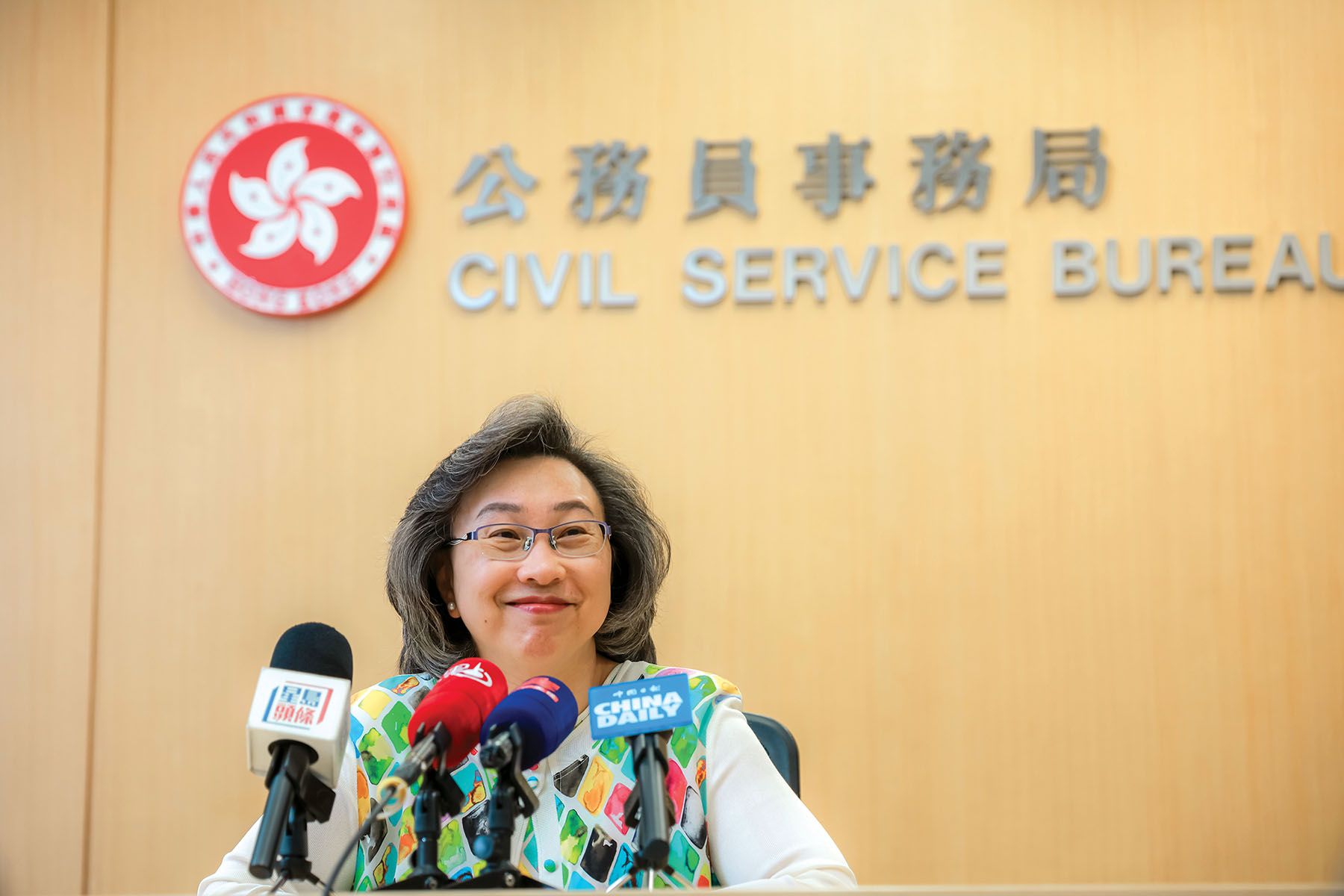Official says stability enables focus on efficiency, public service development
Since its promulgation on June 30, 2020, the National Security Law for Hong Kong (NSL) has restored social stability, enabling civil servants to focus on serving residents and contributing to the city’s development with their expertise, Secretary for the Civil Service Ingrid Yeung Ho Poi-yan said in a recent interview.
As the city’s 173,100-strong civil service prepares to join the community in celebrating the fifth anniversary of the NSL’s enactment, Yeung pledged to lead public servants in safeguarding national security.
ALSO READ: Six arrested in HK for allegedly endangering national security
As the most direct and systematic influence, the NSL paved the way for the city’s electoral system revamp in 2021, which aims to fully implement the “patriots administering Hong Kong” principle and foster more constructive legislative-executive relations.
Compared to five years ago, the Legislative Council has become more efficient and handles an increased number of bills, Yeung said, adding that rational debate between lawmakers and government officials help the authorities better address Hong Kong’s challenges.
The stable social setting, which resulted from the NSL, enabled civil servants to concentrate on their duties with higher morale — they can more effectively address residents’ needs with their expertise, while developing a greater sense of fulfillment and satisfaction at work, she said.
READ MORE: Hong Kong justice secretary hails gains in security awareness
Such high morale, she added, contrasts with that during the social unrest in 2019, when many civil servants felt frustrated, negatively affecting their work.

Yeung urged civil servants to bear in mind their duties in safeguarding national security. Since national security may involve various aspects beyond political and social realms, each civil servant — not just those involved in law enforcement — must exercise sound judgment when confronted with potential risks, she said.
For instance, the government’s public-venue managers should clarify the purpose of activities held at the venues — whether they may pose a threat to national security, Yeung added.
The bureau has utilized various methods to ensure that civil servants have a comprehensive understanding of national security risks, response strategies, and their practices during daily work.
A set of obligatory requirements was immediately put in place. In October 2020, the bureau introduced a requirement for all civil servants who joined on or after July 1 of that year to take an oath and sign declarations indicating their support for the Basic Law and the NSL; In January 2021, the requirement was extended to apply to those who joined the government before July 1, 2020.
READ MORE: NSL upholds HK’s long-term prosperity, 'one country, two systems', experts say
Since 2022, NSL-related content has been incorporated into the city’s civil service recruitment examinations. Effective methods The bureau also encourages civil servants to stay informed and maintain sharp awareness of national security throughout their careers.
Yeung outlined the diverse training courses and lectures designed by the bureau, covering areas such as national policies, diplomacy, finance, and technology.
These programs are integrated into different stages of civil servants’ professional growth, from onboarding sessions for new hires to leadership training for mid- to senior-level officials.

Yeung said such initiatives will continue, aiming to deepen civil servants’ understanding of the country’s progress, global affairs, challenges facing both the nation and Hong Kong, and the current tasks at hand. More importantly, she added, civil servants need to foster a positive and proactive mindset in protecting national security, viewing it as a high priority.
The Civil Service Bureau has arranged various activities infused with patriotic education, which Yeung described as “soft efforts”. These include film screenings, classes on modern Chinese history, exhibitions and visits to historical sites.
In 2023, the bureau organized a training session on national affairs in Nanjing, Jiangsu province. The trip included a visit to Jinghai Temple. In 1842, the venue hosted negotiations for the Treaty of Nanking — the first of the unequal treaties between China and foreign imperialist powers — after the Qing Dynasty (1644-1911) lost the First Opium War to the British.
The treaty led to the cession of Hong Kong Island from the motherland, among other indemnity and tariff conditions — a stark reminder of the influence of national security matters on the city.
READ MORE: Jailed subversive Joshua Wong faces new national security charge
On the other hand, Yeung hopes to help employees learn about the nation’s efforts to promote the wellbeing of Hong Kong residents. As this year marks the 60th anniversary of Dongjiang supplying water to Hong Kong, Yeung said the government plans to arrange visits to related sites on the Chinese mainland to give employees a first-hand experience.
Hong Kong’s destiny is intertwined with that of the nation, Yeung said, and she hopes all civil servants will continue to fulfill their duties in a secure environment, propelling the city’s development to new heights.
Contact the writer at amberwu@chiandailyhk.com


